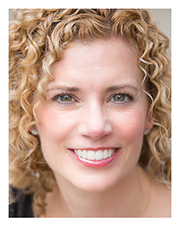
Gather information, build your network of contacts, be curious and patient, and eventually that job will come, says career coach Elatia Abate, AB’99, MBA’08. (Pexels.com)
Below: Portrait of Abate. (Courtesy Elatia Abate)
How the job search has changed since 2008
If you want a job now, says Elatia Abate, AB’99, MBA’08, learn the new rules.
When the economy was booming, says career coach Elatia Abate, AB’99, MBA’08, it was relatively easy to get a job. You put together a good résumé. You found a promising job online and applied for it. And you got hired pretty quickly.
 “Most people who are looking for a job now are still playing by those pre-2008 rules,” Abate says. But after 2008, the hiring dynamic changed. “Companies are preoccupied with mitigating risk. They don’t want to hire the wrong candidate. They’ve got all the time in the world to wait for the perfect person.”
Abate worked in recruitment both before and after the market crash, most recently at Anheuser-Busch and Dow Jones. In 2014 she left the corporate world to start her own business as a career coach.
She meets a lot of job seekers who haven’t updated their approach and feel really frustrated, she says: “Why does HR never get back to me? Why does it feel like I’m sending stuff into a black hole?” In the current market, the least successful way to look for a job is to apply online. The most successful is to try to “get into conversation with people,” Abate says.
Once you’re past the denial phase (“It shouldn’t be this way. I shouldn’t have to do that.”), here are the three steps to finding a job.
“Most people who are looking for a job now are still playing by those pre-2008 rules,” Abate says. But after 2008, the hiring dynamic changed. “Companies are preoccupied with mitigating risk. They don’t want to hire the wrong candidate. They’ve got all the time in the world to wait for the perfect person.”
Abate worked in recruitment both before and after the market crash, most recently at Anheuser-Busch and Dow Jones. In 2014 she left the corporate world to start her own business as a career coach.
She meets a lot of job seekers who haven’t updated their approach and feel really frustrated, she says: “Why does HR never get back to me? Why does it feel like I’m sending stuff into a black hole?” In the current market, the least successful way to look for a job is to apply online. The most successful is to try to “get into conversation with people,” Abate says.
Once you’re past the denial phase (“It shouldn’t be this way. I shouldn’t have to do that.”), here are the three steps to finding a job.
 “Most people who are looking for a job now are still playing by those pre-2008 rules,” Abate says. But after 2008, the hiring dynamic changed. “Companies are preoccupied with mitigating risk. They don’t want to hire the wrong candidate. They’ve got all the time in the world to wait for the perfect person.”
Abate worked in recruitment both before and after the market crash, most recently at Anheuser-Busch and Dow Jones. In 2014 she left the corporate world to start her own business as a career coach.
She meets a lot of job seekers who haven’t updated their approach and feel really frustrated, she says: “Why does HR never get back to me? Why does it feel like I’m sending stuff into a black hole?” In the current market, the least successful way to look for a job is to apply online. The most successful is to try to “get into conversation with people,” Abate says.
Once you’re past the denial phase (“It shouldn’t be this way. I shouldn’t have to do that.”), here are the three steps to finding a job.
“Most people who are looking for a job now are still playing by those pre-2008 rules,” Abate says. But after 2008, the hiring dynamic changed. “Companies are preoccupied with mitigating risk. They don’t want to hire the wrong candidate. They’ve got all the time in the world to wait for the perfect person.”
Abate worked in recruitment both before and after the market crash, most recently at Anheuser-Busch and Dow Jones. In 2014 she left the corporate world to start her own business as a career coach.
She meets a lot of job seekers who haven’t updated their approach and feel really frustrated, she says: “Why does HR never get back to me? Why does it feel like I’m sending stuff into a black hole?” In the current market, the least successful way to look for a job is to apply online. The most successful is to try to “get into conversation with people,” Abate says.
Once you’re past the denial phase (“It shouldn’t be this way. I shouldn’t have to do that.”), here are the three steps to finding a job.
